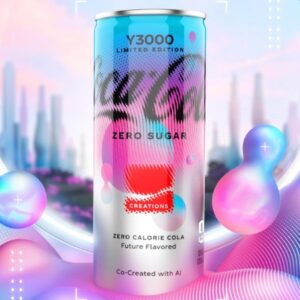 Consumers have always had a close relationship with brands, going so deep where brands become part of our personal identities. Whether you are a “Ford gal” or a “Chevy gal,” use Apple products as social signals, walk around with a famous manufacturer’s name on your t-shirt, or have to own the fashionable and reusable beverage container of the moment, brand identities are intimately interwoven with our personal identities. For the brands themselves, these relationships are priceless.
Consumers have always had a close relationship with brands, going so deep where brands become part of our personal identities. Whether you are a “Ford gal” or a “Chevy gal,” use Apple products as social signals, walk around with a famous manufacturer’s name on your t-shirt, or have to own the fashionable and reusable beverage container of the moment, brand identities are intimately interwoven with our personal identities. For the brands themselves, these relationships are priceless.
In parallel, digital technology has infiltrated our lives and homes and is always on. Because of this intimacy, its natural for brands to experiment and leverage digital technology to connect with their consumers in more and more personal settings. In fact, the relationship is so tight that the business model of certain technology requires brands for revenue.
How are different consumer activities being influenced by this rapid growth of technology and digitization of brands?
How do consumers prefer to shop?
What drives the preference for digital solutions over in-store shopping? Between time crunching, convenience and the allure of personalized shopping experiences, consumers in this digital age are armed with smartphones full of apps that help them navigate their shopping experiences whenever and wherever they are. AI Technology is being used to gather consumer preferences and create micro targeting algorithms to tailor products to a consumer’s needs. Nowhere is this more prevalent than the post-COVID-19 environment where shopping apps connected consumers directly to stores and drivers to take over grocery shopping and food delivery at scale.
 These days, we’re seeing ad-hoc personal assistants, life coaches, and emotional companions popping up in app stores, geared and ready to form real life bonds with both adults and children. For example, an AI research lab, AI Foundation, recently launched a new platform called AI.XYZ where users can design their own AI personalized assistant to do everyday mundane digital tasks like update calendars, send emails, schedule appointments, and set reminders so people can “Go be human, Let your AI deal with the rest.” How will brands leverage these new channels of communication to create deeper connections?
These days, we’re seeing ad-hoc personal assistants, life coaches, and emotional companions popping up in app stores, geared and ready to form real life bonds with both adults and children. For example, an AI research lab, AI Foundation, recently launched a new platform called AI.XYZ where users can design their own AI personalized assistant to do everyday mundane digital tasks like update calendars, send emails, schedule appointments, and set reminders so people can “Go be human, Let your AI deal with the rest.” How will brands leverage these new channels of communication to create deeper connections?
In another unique piece of research, Curion teamed up with a mega social media brand to determine consumer preferences and desires for a new conversational support tool. Through in-depth usability studies, Curion launched and measured performance of the new tool with a cohort of multi-national social media users of varying ages and experience. With the results, the client learned the key drivers of the experience among the different consumer groups and locations, allowing the client to optimize their AI and associated features to their specific consumer target.
With consumer preferences shifting so rapidly, brands need to stay informed with data and insights on what their customers prefer and how their journey truly looks based on purchase channels.
Enhancing the shopping experience
What makes a good shopping experience great? Perhaps it’s a perfectly placed product or a tailored shopping experience, fit for their needs? Brands can construct a meaningful and impactful consumer shopping journey around how their target audience prefers to shop.
The start-to-finish shopper journey, created with the right data and insights, can help brands understand the shopper’s jobs to be done as they come to experience a product and the way it makes them feel.
Advanced digital technologies can help brands interact with consumers and collect feedback across every touchpoint on the journey, rather than a select few. Also, these technologies can introduce new ways to interact and connect with consumers for a more personalized experience, allowing brands to learn from their consumers and find ways to make improvements and anticipate consumer needs.
Using the combined qualitative and quantitative expertise of Curion, we conducted customer research with a large supermarket chain to optimize the digital shopper journey from online order to pick-up. Customers used our digital platform to provide multi-touchpoint feedback about their likes, frustrations, and experiences with competition. With this information in hand, the retailer was able to significantly improve the shopper experience thus increasing return visit rates.
Leveraging the advanced digital realm to connect with target consumers
The digital world can present a more dynamic playground for CPG brands across industries to connect with the right consumers.
The restaurant industry has applied digital ordering for a convenient consumer experience. Apps and kiosks allow patrons to customize their orders for contactless dining. A study revealed that 65% of restaurant patrons said they would visit a restaurant more often if self-service kiosks were offered, and 30% saying they prefer ordering from a kiosk if the lines are of equal length. However, it remains important to conduct usability research to supporting consumer preferences. While consumers seem to prefer convenience, self-checkout options are ripe with consumer frustrations, resulting in stores removing it completely and going back to a more reliable human experience.
 The virtual world has also impacted the food and beverage landscape across various mega brands that have adopted advanced digital solutions. For example, Coca-Cola introduced a limited-edition soda flavor with the help of AI, called Coca-Cola Y3000. The new flavor is said to represent what Coke would taste like in the future in the year 3000.
The virtual world has also impacted the food and beverage landscape across various mega brands that have adopted advanced digital solutions. For example, Coca-Cola introduced a limited-edition soda flavor with the help of AI, called Coca-Cola Y3000. The new flavor is said to represent what Coke would taste like in the future in the year 3000.
Nestlé and Starbucks have also gotten on board with opportunities to connect to consumers through the digital realm. Nestlé uses VR technology for a new app called “Taste the Mood” where users can virtually explore scenic landscapes that tie into their products to build a more memorable and enjoyable experience. Starbucks uses VR to offer virtual tours of their coffee farms and see the journey of their coffee beans from its harvest to the final product, providing engagement, education, and a display of their sustainable efforts around ethical sourcing.
The popularity of gamification is also seen across beauty and personal care brands, like e.l.f. Cosmetics and their virtual world that launched on Roblox in November 2023. This captures the attention of Gen Z and their love of gaming, with a twist. On this platform, the brand teaches entrepreneurial skills to the young generation and encourages users to create their own startup pulling inspiration from causes that are important to them.
Retail stores are also implementing advanced digital technologies through store apps and enhanced contactless shopping. AI chatbots are providing instant customer service for consumers on retail websites and apps. In some instances, retailers have remote employees with custom-built in-store avatars to provide customer service. Freshii is testing out a new solution that uses a virtual cashier system which is connected to call centers. Green Lawson, a futuristic Japanese convenience store, uses avatars as animated staff that is controlled by humans.
What does the advanced digital future look like?
The digital future is endless, with a continuous future outlook and impact on consumer habits and preferences. Futuristic digital solutions are coming to markets, providing even more innovation and connection with consumers. What’s in store for the future of an even greater advanced digital technology world?
- Biometric Shopping Experiences: Biometric sensors like facial recognition and fingerprint scanning are being further explored for seamless payment transactions. Amazon implements this at their Amazon Go Grocery shops and now a new Amazon One palm print payment system is coming to select grocery stores, working by reading users’ palm print biometrics.
- Holographic Shopping Assistants: Holographic shopping assistants are emerging as a futuristic digital solution. Run by AI, these holograms can guide consumers through product selections, provide detailed information, and even offer styling advice. Luxury retail stores are in early trial periods, but this solution shows high potential to elevate and attract consumers back to in-store shopping experiences.
- Emotion-Sensitive Packaging: Still in experimental stages, new packaging solutions are incorporating emotion-sensing technology to create a more engaging and personalized connection between consumers and products. Sensor technologies within the packaging can detect consumer emotions, allowing the packaging to respond with personalized messages, promotions, or interactive content.
What’s your call to action?
Huge shifts in consumer preferences toward deeper personalized technology solutions will continue to provide more convenience and efficiency to the way consumers live and shop, and ultimately more profits for retailers and brands that incorporate advanced technology. Deep explorations into advanced digital technologies and solutions can bring brands closer to their target consumers. Current and prospective customers can be invited to co-ideate, co-design, and rebuild products alongside brands, collecting valuable qualitative insights along the way. Insights from a brand’s target consumer can help reinvent the journey to include advanced digital solutions at the right touchpoints and the right time.
About Curion:
Curion specializes in delivering impactful insights to the world’s top CPG companies, helping them develop winning, repeatedly purchased products. Curion’s deep data-driven product insights, sensory expertise, and state-of-the-art consumer centers enable them to uncover responses to critical client objectives. With over five decades of experience in the product testing industry, Curion is dedicated to guiding clients with their proprietary XP Xperience Performance platform, connecting brands to consumers at every step. An innovator in the industry, Curion recently developed a groundbreaking benchmarking product testing method, the Curion Score™, which has become a trusted and sought after tool within the industry. As one of the largest product and consumer insights companies in the U.S., Curion has built a reputation for excellence and trust among the world’s leading consumer brands. Curion’s commitment to innovation and expertise, coupled with a passion for delivering actionable insights, makes Curion a valuable partner for companies looking to develop and launch successful products.
